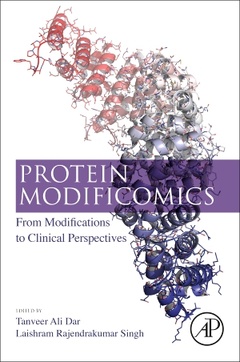Protein Modificomics From Modifications to Clinical Perspectives
Coordonnateurs : Dar Tanveer Ali, Singh Laishram Rajendrakumar

Protein Modificomics: From Modifications to Clinical Perspectives comprehensively deals with all of the most recent aspects of post-translational modification (PTM) of proteins, including discussions on diseases involving PTMs, such as Alzheimer?s, Huntington?s, X-linked spinal muscular atrophy-2, aneurysmal bone cyst, angelman syndrome and OFC10. The book also discusses the role PTMs play in plant physiology and the production of medicinally important primary and secondary metabolites. The understanding of PTMs in plants helps us enhance the production of these metabolites without greatly altering the genome, providing robust eukaryotic systems for the production and isolation of desired products without considerable downstream and isolation processes.
1. Emerging roles of posttranslational modifications in biological processes and their implications in associated diseases 2. Clinical perspective of posttranslational modifications 3. Phosphorylation and acetylation of proteins as posttranslational modification: implications in human health and associated diseases 4. Protein modifications and lifestyle disorders 5. Ubiquitin mediated posttranslational modification of proteins involved in various signaling diseases 6. Improving pharmacological efficacy of protein pharmaceuticals by glycosylation 7. Posttranslational modification in human therapeutics heterologously produced in plant host expression systems 8. Protein modification in plants in response to abiotic stress 9. Posttranslational modifications associated with cancer and their therapeutic implications 10. Nonenzymatic posttranslational protein modifications: mechanisms and associated disease pathologies 11. Protein covalent modification by homocysteine: consequences and clinical implications 12. Posttranslational modifications in algae: role in stress response and biopharmaceutical production 13. Protein glycosylation: an important tool in diagnosis or early detection of diseases
Dr. Laishram Rajendrakumar Singh is a Professor at the University of Delhi, India. He obtained his PhD in protein biophysics from Jamia Millia Islamia, New Delhi, and following this continued his postdoctoral research at Fox Chase cancer Center, Philadelphia (FCCC), USA. During his doctoral study he was engaged in investigating how small molecule compounds affect native protein structure, stability and enzymatic catalysis. At FCCC his main research interest encompasses understanding the proteiostasis and modulators toward the functional restoration of disease-causing pathogenic protein variants. Currently Dr. Singh is working on understanding the molecular insights of proteopathy and developing small molecule compounds for various toxic protein inclusions associated with neurodegenerative diseases. He has more than 75 publications to his credit in various international journals of repute. He is also guest editor and editorial member of various international journals.
- Provides thorough insights into the post translational modifications (PTMs) of proteins in both the plant and animal kingdom
- Presents diagrammatic representations of various protein modification and estimation mechanisms in four-color
- Includes coverage of diseases involving post translational modifications
Date de parution : 05-2019
Ouvrage de 387 p.
15x22.8 cm
Thèmes de Protein Modificomics :
Mots-clés :
PTMs; protein folding; proteins; post translational modifications; modificomics



